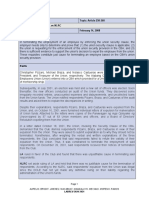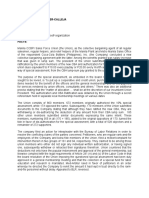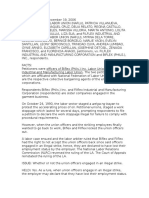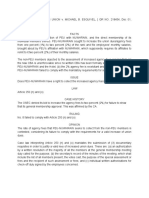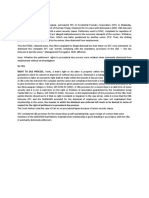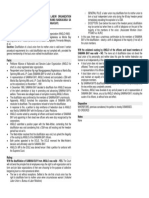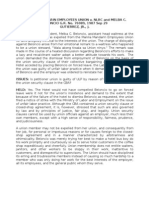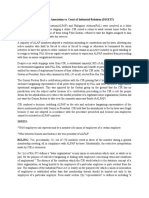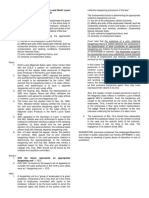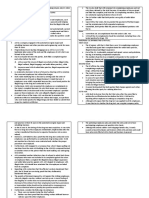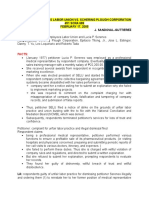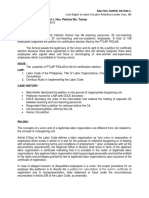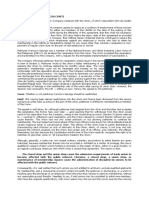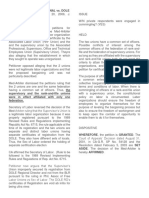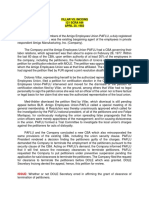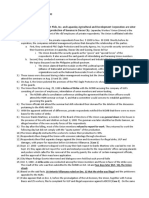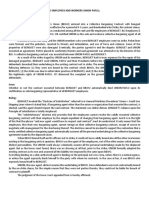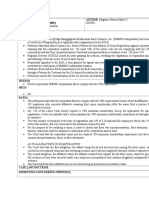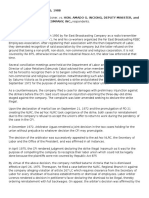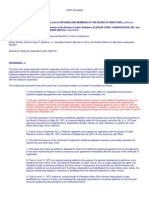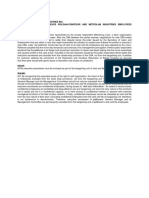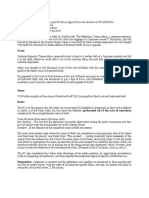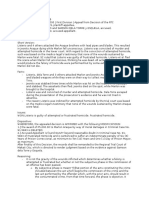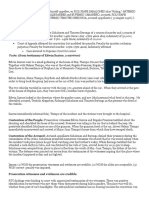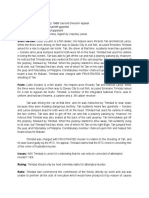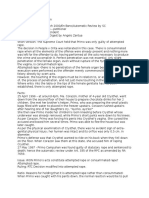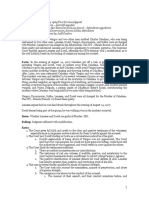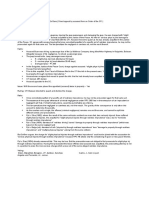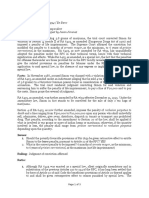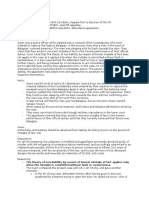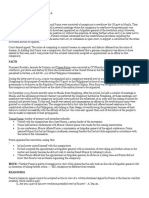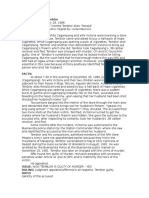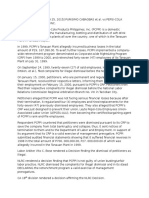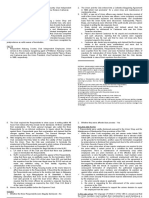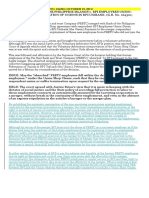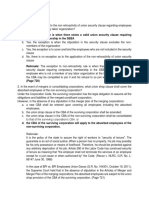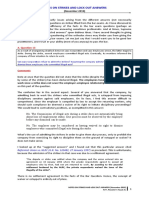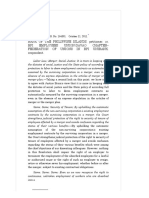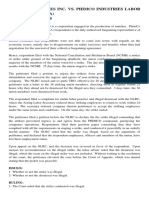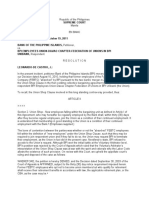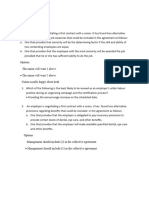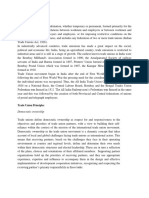0 ratings0% found this document useful (0 votes)
398 views099 Alabang Country Club V NLRC (2008)
099 Alabang Country Club V NLRC (2008)
Uploaded by
Samantha Ann T. TirthdasUnion and Club entered into a CBA containing a Union Shop and Maintenance of Membership Shop provision. Respondents here, who were former Union officers, were found guilty of malversation of public funds which caused their expulsion from the Union. Union requested Club to terminate the Respondents pursuant to the Union Shop and Maintenance of Membership Shop provisions of the CBA. Club conducted investigation and found that Union had cause to expel Respondents, thus Club was compelled to terminate the Respondents pursuant to the CBA. Respondents assail the dismissal. SC held that there was valid cause for termination because Union Shop and Maintenance of Membership Provisions have been recognized by jurisprudence as valid
Copyright:
© All Rights Reserved
Available Formats
Download as DOCX, PDF, TXT or read online from Scribd
099 Alabang Country Club V NLRC (2008)
099 Alabang Country Club V NLRC (2008)
Uploaded by
Samantha Ann T. Tirthdas0 ratings0% found this document useful (0 votes)
398 views3 pagesUnion and Club entered into a CBA containing a Union Shop and Maintenance of Membership Shop provision. Respondents here, who were former Union officers, were found guilty of malversation of public funds which caused their expulsion from the Union. Union requested Club to terminate the Respondents pursuant to the Union Shop and Maintenance of Membership Shop provisions of the CBA. Club conducted investigation and found that Union had cause to expel Respondents, thus Club was compelled to terminate the Respondents pursuant to the CBA. Respondents assail the dismissal. SC held that there was valid cause for termination because Union Shop and Maintenance of Membership Provisions have been recognized by jurisprudence as valid
Original Description:
digest
Original Title
099 Alabang Country Club v NLRC (2008)
Copyright
© © All Rights Reserved
Available Formats
DOCX, PDF, TXT or read online from Scribd
Share this document
Did you find this document useful?
Is this content inappropriate?
Union and Club entered into a CBA containing a Union Shop and Maintenance of Membership Shop provision. Respondents here, who were former Union officers, were found guilty of malversation of public funds which caused their expulsion from the Union. Union requested Club to terminate the Respondents pursuant to the Union Shop and Maintenance of Membership Shop provisions of the CBA. Club conducted investigation and found that Union had cause to expel Respondents, thus Club was compelled to terminate the Respondents pursuant to the CBA. Respondents assail the dismissal. SC held that there was valid cause for termination because Union Shop and Maintenance of Membership Provisions have been recognized by jurisprudence as valid
Copyright:
© All Rights Reserved
Available Formats
Download as DOCX, PDF, TXT or read online from Scribd
Download as docx, pdf, or txt
0 ratings0% found this document useful (0 votes)
398 views3 pages099 Alabang Country Club V NLRC (2008)
099 Alabang Country Club V NLRC (2008)
Uploaded by
Samantha Ann T. TirthdasUnion and Club entered into a CBA containing a Union Shop and Maintenance of Membership Shop provision. Respondents here, who were former Union officers, were found guilty of malversation of public funds which caused their expulsion from the Union. Union requested Club to terminate the Respondents pursuant to the Union Shop and Maintenance of Membership Shop provisions of the CBA. Club conducted investigation and found that Union had cause to expel Respondents, thus Club was compelled to terminate the Respondents pursuant to the CBA. Respondents assail the dismissal. SC held that there was valid cause for termination because Union Shop and Maintenance of Membership Provisions have been recognized by jurisprudence as valid
Copyright:
© All Rights Reserved
Available Formats
Download as DOCX, PDF, TXT or read online from Scribd
Download as docx, pdf, or txt
You are on page 1of 3
At a glance
Powered by AI
The key takeaways are that union shop and maintenance of membership provisions are valid causes for termination of employment according to jurisprudence. Employers must also substantially comply with due process when terminating employees based on requests from unions.
The union discovered irregularities in their funds after an audit. Respondents Pizarro, Braza, and Castueras who were former union officers were found responsible and expelled from the union for malversation of union funds. The union then requested the employer to terminate respondents based on the union security clause in the CBA.
Respondents assailed their dismissal, arguing it was invalid. The issue was whether there was valid cause for their termination based on the union security clause in the CBA.
Alabang Country Club, Inc.
v NLRC, Alabang Country Club
Independent Employees Union, Christopher Pizarro, Michael Braza,
Nolasco Castueras
G.R. No. 170287; 14 February 2008; Velasco, Jr., J.
Digest by Dudday
SUMMARY
Union and Club entered into a CBA containing a Union Shop and
Maintenance of Membership Shop provision. Respondents here,
who were former Union officers, were found guilty of malversation
of public funds which caused their expulsion from the Union. Union
requested Club to terminate the Respondents pursuant to the Union
Shop and Maintenance of Membership Shop provisions of the CBA.
Club conducted investigation and found that Union had cause to
expel Respondents, thus Club was compelled to terminate the
Respondents pursuant to the CBA. Respondents assail the
dismissal. SC held that there was valid cause for termination
because Union Shop and Maintenance of Membership Provisions
have been recognized by jurisprudence as valid causes of
termination.
FACTS
1. Respondent Alabang Country Club Independent Employees
Union (Union) is the exclusive bargaining agent of Petitioner
Alabang Country Club, Inc. (Club)s rank-and-file employees.
Respondents Pizarro, Braza, and Castueras were the Union
President, Vice-President and Treasurer in 1996, respectively.
2. The Union and the Club entered into a Collective Bargaining
Agreement in 1999 which had provisions 1 for a union shop and
maintenance of membership shop.
3. In 2001, a new set of Union officers was elected. During the
conduct of audit of the Union funds by these new officers, some
irregularly recorded entries, unaccounted expenses and
disbursements, and uncollected loans from the Union funds
were discovered. Subsequently, Pizarro, Braza, and Castueras
were informed of the audit results and were asked to explain in
writing the discrepancies found.
a. Braza denied any wrongdoing and instead asked that the
investigation be addressed to Castueras who was the Union
Treasurer at tat time.
b. Pizarro also blamed Castueras for his unpaid and
uncollected loan and cash advances, claiming that his
salaries were regularly deducted to pay his loan and that he
does not know why there remained unpaid in the records.
c. Castueras also denied any wrongdoing and claimed that the
irregular entries in the records were unintentional and were
due to inadvertence because of his voluminous work.
4. Despite their explanations, Respondents Pizarro, Braza, and
Castueras were expelled from the Union and were furnished
1 ARTICLE IIUNION SECURITY
SECTION 2. [COMPULSORY] UNION MEMBERSHIP FOR NEW REGULAR RANKANDFILE
EMPLOYEES
a) New regular rankandfile employees of the Club shall join the UNION within five (5)
days from the date of their appointment as regular employees as a condition for
their continued employment during the lifetime of this Agreement, otherwise, their
failure to do so shall be a ground for dismissal from the CLUB upon demand by the
UNION.
xxxx
SECTION 4. TERMINATION UPON UNION DEMAND. Upon written demand of the
UNION and after observing due process, the Club shall dismiss a regular rankandfile
employee on any of the following grounds:
(a) Failure to join the UNION within five (5) days from the time of regularization
(b) Resignation from the UNION, except within the period allowed by law
(c) Conviction of a crime involving moral turpitude
(d) Nonpayment of UNION dues, fees, and assessments
(e) Joining another UNION except within the period allowed by law
(f) Malversation of union funds
(g) Actively campaigning to discourage membership in the UNION and
(h) Inflicting harm or injury to any member or officer of the UNION.
It is understood that the UNION shall hold the CLUB free and harmless [sic] from any
liability or damage whatsoever which may be imposed upon it by any competent
judicial or quasijudicial authority as a result of such dismissal and the UNION shall
reimburse the CLUB for any and all liability or damage it may be adjudged.
individual letters of expulsion for malversation of Union funds.
The Union then invoked the Security Clause of the CBA and
demanded that the Club dismiss Respondents in view of their
expulsion from the Union.
5. The Club required the Respondents to show cause in writing
within 48 hours from notice why they should not be dismissed.
All three submitted their explanations. The Clubs general
manager also called the three Respondents for an informal
conference to inquire about the charges against them.
Respondents gave their explanation and claimed that the
charges against them are baseless. The General Manager then
announced that he would conduct a formal investigation.
6. After weighing the verbal and written explanations of the
Respondents, Club concluded that they failed to refute the
validity of their expulsion from the Union. Thus, the Club was
constrained to terminate the employment of the Respondents
pursuant to which notices of termination were sent to the
Respondent on December 26, 2001.
7. Respondents then filed a complaint for illegal dismissal in the
NLRC.
a. LA ruled in favor of the Club and found that there was
justifiable cause in termination the Respondents.
b. NLRC reversed the LA and granted the appeal of the
Respondents, ruling that there was no justifiable cause for
the termination. NLRC relied on Section 22, Rule XVIII, of the
Labor Code IRR, and held that the expulsion from the Union
was illegal since the DOLE had not yet made any definitive
ruling on their liability regarding the administration of the
Union funds.
c. CA upheld the NLRC Ruling, focusing mainly on the Clubs
failure to afford due process to the Respondents. It found
that the dismissal of the Respondents was contrary to the
doctrine laid down in Malayang Samahan ng mga
Manggagawa sa M. Greenfield v Ramos (Malayang
Samahan) that even on the assumption that the Union had
valid grounds to expel the local Union officers, due process
requires that the Union officers be accorded a separate
2
SEC. 2. Actions arising from Article 241 of the Code. Any action arising
from the administration or accounting of union funds shall be filed and disposed of
as an intra-union dispute in accordance with Rule XIV of this Book.In case of
violation, the Regional or Bureau Director shall order the responsible officer to
render an accounting of funds before the general membership and may, where
circumstances warrant, mete the appropriate penalty to the erring officer/s,
including suspension or expulsion from the union.
hearing by the employer company as required by Sec. 2(b) 3,
Rule XXIII, Book V of the Labor Code IRR.
8. Hence, the present petition before the Supreme Court.
ISSUES
1. Whether the three Respondents were illegally dismissed No
2. Whether they were afforded due process - Yes
RULING AND RATIO
1. Respondents were validly dismissed pursuant to the Union Shop
and the Maintenance of Membership Shop provisions of the CBA.
While the Labor Code recognizes only just causes under Article
282, authorized causes under Article 283, termination due to
disease under Article 284, and termination by employee or
resignation under Article 285 as the grounds for termination,
another cause for termination recognized by jurisprudence is
dismissal from employment due to the enforcement of the
Union Security Clause in the CBA.
There is union shop when all new regular employees are
required to join the union within a certain period as a condition
for their continued employment. There is maintenance of
membership shop when employees who are union members as
of the effective date of the agreement, or who thereafter
become members, must maintain union membership as a
condition for continued employment until they are promoted or
transferred out of the bargaining unit or the agreement is
terminated. This practice strengthens the union and prevents
disunity in the bargaining unit within the duration of the CBA.
By preventing member disaffiliation with the threat of expulsion
from the union and the consequent termination of employment,
the authorized bargaining representative gains more numbers
and strengthens its position as against other unions which may
want to claim majority representation.
The requisites to constitute just cause for terminating an
employee based on CBAs Union Security Provision which must
be determined and proved by the employer are:
a. the union security clause is applicable
3
SEC. 2. Standards of due process requirements of notice. In all cases of
termination of employment, the following standards of due process shall be
substantially observed:For termination of employment based on just causes as
defined in Article 282 of the Code:
xxxx
(b) A hearing or conference during which the employee concerned, with the
assistance of counsel if the employee so desires, is given opportunity to respond to
the charge, present his evidence or rebut the evidence presented against him.
b. the union is requesting for the enforcement of the union
security provision in the CBA
c. there is sufficient evidence to support the unions decision to
expel the employee from the union
In the case at bar: the language of Article II of the CBA is
unequivocal that the Union members must maintain their
membership in good standing as a condition sine qua non for their
continued employment and it is also clear that upon demand by the
Union and after due process, the Club shall terminate the
employment of the employee found liable for any of the offenses
stated therein.
Respondents were expelled from and by the Union after due
investigation for acts of dishonesty and malversation of Union
funds. The Union properly requested the Club to enforce the Union
Security provision in the CBA to terminate the Respondents. In
compliance with the Unions request, the Club reviewed the
documents and requested explanations from Respondents. Only
after it had determined that there was sufficient evidence that the
Respondents malversed Union funds did the Club dismissed them
from their employment.
2. There is substantial compliance with the due process
requirements.
Malayang Samahan case, where the Supreme Court pronounced
that while the company, under a maintenance of membership
provision of the CBA, is bound to dismiss any employee
expelled by the union for disloyalty upon its written request,
this undertaking should not be done hastily and summarily, lest
the company will be acting in bad faith in dismissing a worker
without giving him the benefit of a hearing, is not applicable in
the present case.
The Club has substantially complied with due process. The three
respondents were notified that their dismissal was being
requested by the Union, and their explanations were heard
(unlike in the Malayang Samahan case where both the union
and the company did not conducted administrative hearings).
Then, the Club, through its President, conferred with said
respondents during the last week of October 2001. The three
respondents were dismissed only after the Club reviewed and
considered the documents submitted by the Union visavis the
written explanations submitted by said respondents.
Petition GRANTED. NLRC REVERSED AND SET ASIDE.
Valid dismissal.
You might also like
- GR 170830 - Phimco Vs Pila (Labor)Document3 pagesGR 170830 - Phimco Vs Pila (Labor)Colleen Rose Guantero100% (2)
- Villar Vs InciongDocument2 pagesVillar Vs InciongRZ Zamora100% (2)
- Lab Rel Case Digests Part 5 - CompiledDocument77 pagesLab Rel Case Digests Part 5 - CompiledRizza Angela MangallenoNo ratings yet
- SAMAHAN NG MANGGAGAWA SA HANJIN SHIPYARD Vs BLRDocument2 pagesSAMAHAN NG MANGGAGAWA SA HANJIN SHIPYARD Vs BLRMonikka Delera75% (4)
- 03 San Miguel Foods v. San Miguel Corporation Employees UnionDocument2 pages03 San Miguel Foods v. San Miguel Corporation Employees UnionJulius Geoffrey Tangonan100% (1)
- Velasco v. PeopleDocument1 pageVelasco v. PeopleSamantha Ann T. Tirthdas100% (1)
- Rivera v. PeopleDocument2 pagesRivera v. PeopleSamantha Ann T. Tirthdas100% (1)
- People v. ValdezDocument1 pagePeople v. ValdezSamantha Ann T. Tirthdas100% (1)
- TELS3340Chapter 14,15 and 16 PDFDocument19 pagesTELS3340Chapter 14,15 and 16 PDFArbindchaudhary100% (1)
- 21 - Alabang Country Club Inc Vs NLRCDocument3 pages21 - Alabang Country Club Inc Vs NLRCchiwi magdaluyoNo ratings yet
- Palacol v. Ferrer-Calleja G.R. No. 85333 February 26, 1990Document2 pagesPalacol v. Ferrer-Calleja G.R. No. 85333 February 26, 1990mjpjore100% (1)
- 115 PICOP Resources, Inc. (PRI) v. TañecaDocument2 pages115 PICOP Resources, Inc. (PRI) v. TañecaRein GallardoNo ratings yet
- Biflex Vs FilflexDocument2 pagesBiflex Vs FilflexRia Kriselle Francia PabaleNo ratings yet
- PENINSULA EMPLOYEES UNION Vs EsquivelDocument2 pagesPENINSULA EMPLOYEES UNION Vs EsquivelChap ChoyNo ratings yet
- Case Digest - Golden Farms Vs Sec of LaborDocument1 pageCase Digest - Golden Farms Vs Sec of LaborRoland de la Cruz100% (3)
- Divine Word University of Tacloban v. Secretary of Labor and Employment Et AlDocument2 pagesDivine Word University of Tacloban v. Secretary of Labor and Employment Et AlWinter Woods100% (1)
- Ferrer Vs NLRC (1993)Document1 pageFerrer Vs NLRC (1993)NC BergoniaNo ratings yet
- Nacusip-Tucp vs. Dir. Cresenciano B. Trajano, Fur-Tucp and NasurefcoDocument2 pagesNacusip-Tucp vs. Dir. Cresenciano B. Trajano, Fur-Tucp and NasurefcoAngelReaNo ratings yet
- Samahang Manggagawa Sa Sulpicio Lines vs. Sulpicio Lines, Inc. - Case DigestDocument2 pagesSamahang Manggagawa Sa Sulpicio Lines vs. Sulpicio Lines, Inc. - Case DigestRoxanne PeñaNo ratings yet
- Alliance v. Samana Case DigestDocument1 pageAlliance v. Samana Case Digestkim_santos_20No ratings yet
- Manila Mandarin v. NLRCDocument1 pageManila Mandarin v. NLRCAnonymous Xkzaifvd100% (1)
- Oriental Tin Can Labor Union vs. SOLEDocument2 pagesOriental Tin Can Labor Union vs. SOLEVanya Klarika NuqueNo ratings yet
- Airline Pilots Association Vs CIR (DIGEST)Document2 pagesAirline Pilots Association Vs CIR (DIGEST)Danielle Ray V. VelascoNo ratings yet
- Itogon-Suyoc Mines v. Sangilo-Itogon Workers' UnionDocument2 pagesItogon-Suyoc Mines v. Sangilo-Itogon Workers' UnionAngela ConejeroNo ratings yet
- Samahan NG Manggagawa Sa Top Form Manufacturing v. NLRCDocument2 pagesSamahan NG Manggagawa Sa Top Form Manufacturing v. NLRCJazz TraceyNo ratings yet
- Employee Union of Bayer V Bayer Phil.Document2 pagesEmployee Union of Bayer V Bayer Phil.Niajhan Palattao100% (2)
- ELISCO-ELIROL LABOR UNION v. CARMELO NORIEL Full TextDocument2 pagesELISCO-ELIROL LABOR UNION v. CARMELO NORIEL Full TextCeline CabadingNo ratings yet
- 01 Filipro V NestleDocument2 pages01 Filipro V NestlePio Guieb Aguilar100% (3)
- CABEU-NFL Vs Central Azucarera de Bais (DIGEST)Document2 pagesCABEU-NFL Vs Central Azucarera de Bais (DIGEST)Raima Marjian Sucor100% (1)
- Philippine Village Hotel Vs NLRCDocument1 pagePhilippine Village Hotel Vs NLRCvaleryannsNo ratings yet
- Capitol Medical Center V Laguesma DigestDocument2 pagesCapitol Medical Center V Laguesma DigestwilsonrocketNo ratings yet
- 01 San Miguel Corporation v. LaguesmaDocument1 page01 San Miguel Corporation v. LaguesmaRaymund CallejaNo ratings yet
- Automotive Engine Rebuilders v. Progresibong UnyonDocument2 pagesAutomotive Engine Rebuilders v. Progresibong UnyonIsay YasonNo ratings yet
- Pilipino Telephone Corporation V PILTEADocument2 pagesPilipino Telephone Corporation V PILTEARaymund CallejaNo ratings yet
- Atlas Vs LaguesmaDocument2 pagesAtlas Vs Laguesmajuillien isiderioNo ratings yet
- Phoenix Iron and Steel Corp v. Secretary of Labor - Case DigestDocument2 pagesPhoenix Iron and Steel Corp v. Secretary of Labor - Case DigestRoxanne PeñaNo ratings yet
- Romeo Dabuet, Et. Al. vs. Roche Pharmaceuticals G.R. No. L-45402 April 30, 1987 PADILLA, J.Document2 pagesRomeo Dabuet, Et. Al. vs. Roche Pharmaceuticals G.R. No. L-45402 April 30, 1987 PADILLA, J.Patricia Mae0% (1)
- Schering Employees Labor Union vs. Schering Plough CorporationDocument3 pagesSchering Employees Labor Union vs. Schering Plough CorporationAnny Yanong100% (1)
- 162 MSF Tire and Rubber v. CADocument2 pages162 MSF Tire and Rubber v. CAmaite fernandezNo ratings yet
- Filipino Pipe v. NLRCDocument2 pagesFilipino Pipe v. NLRCTippy Dos SantosNo ratings yet
- Holy Child Catholic School v. Hon. Patricia Sto. Tomas DIGESTDocument2 pagesHoly Child Catholic School v. Hon. Patricia Sto. Tomas DIGESTRatani Unfriendly100% (1)
- Gr. No. 177937Document3 pagesGr. No. 177937Robehgene Atud-JavinarNo ratings yet
- Philippine Diamond Hotel v. Manila Diamond Hotel Employees UnionDocument4 pagesPhilippine Diamond Hotel v. Manila Diamond Hotel Employees UnionTrisha OrtegaNo ratings yet
- Salunga V CirDocument2 pagesSalunga V Cirpang downloadNo ratings yet
- 05 COASTAL SUBIC BAY TERMINAL Vs DOLEDocument1 page05 COASTAL SUBIC BAY TERMINAL Vs DOLEAce QuebalNo ratings yet
- Villar vs. InciongDocument2 pagesVillar vs. InciongAnny YanongNo ratings yet
- Lapanday Workers Union v. NLRCDocument3 pagesLapanday Workers Union v. NLRCJDR JDRNo ratings yet
- 115 Sukhothai Cuisine Vs CADocument3 pages115 Sukhothai Cuisine Vs CAJohn Michael VidaNo ratings yet
- (Art. 247-249) ST. JOHN COLLEGES, INC. vs. ST. JOHN ACADEMY FACULTY AND EMPLOYEES UNION DigestDocument3 pages(Art. 247-249) ST. JOHN COLLEGES, INC. vs. ST. JOHN ACADEMY FACULTY AND EMPLOYEES UNION DigestNikki MendozaNo ratings yet
- University of Immaculate Concepcion,. Inc. v. Sec. of LaborDocument4 pagesUniversity of Immaculate Concepcion,. Inc. v. Sec. of LaborEmir MendozaNo ratings yet
- Benguet Consolidated, Inc. vs. BCI Employees & Workers Union-PAFLU, G.R. No. L-24711, April 30, 1968Document1 pageBenguet Consolidated, Inc. vs. BCI Employees & Workers Union-PAFLU, G.R. No. L-24711, April 30, 1968lexxNo ratings yet
- Mariwasa Vs Sec. of DOLE DigestDocument2 pagesMariwasa Vs Sec. of DOLE DigestTrxc MagsinoNo ratings yet
- Victoria Vs InciongDocument3 pagesVictoria Vs Inciongjzzafe2100% (1)
- Nuwhrain V CADocument2 pagesNuwhrain V CAZoe VelascoNo ratings yet
- Elisco-Elirol Labor Union Vs NorielDocument3 pagesElisco-Elirol Labor Union Vs NorieltengloyNo ratings yet
- SILVALA - Labor Law II PDFDocument20 pagesSILVALA - Labor Law II PDFMaricris SilvalaNo ratings yet
- The Heritage Hotel Manila (Owned and Operated by Grand Plaza Hotel Corporation) PetitionerDocument2 pagesThe Heritage Hotel Manila (Owned and Operated by Grand Plaza Hotel Corporation) PetitionerBon BonsNo ratings yet
- Heritage vs. DOLE Secretary (Case Digest)Document2 pagesHeritage vs. DOLE Secretary (Case Digest)Rikki Banggat100% (1)
- Tabangao Shell Refinery Employees Association v. Pilipinas Shell Petroleum Corporation - DigestDocument2 pagesTabangao Shell Refinery Employees Association v. Pilipinas Shell Petroleum Corporation - DigestRoxanne Peña50% (2)
- Laguna Autoparts Manufacturing Corporation vs. Sec. of LaborDocument1 pageLaguna Autoparts Manufacturing Corporation vs. Sec. of LaborMCNo ratings yet
- METROLAB INDUSTRIES INC. vs. HON. MA. NIEVES ROLDAN-CONFESOR AND METROLAB INDUSTRIES EMPLOYEES ASSOCIATION - DigestDocument1 pageMETROLAB INDUSTRIES INC. vs. HON. MA. NIEVES ROLDAN-CONFESOR AND METROLAB INDUSTRIES EMPLOYEES ASSOCIATION - DigestRoxanne Peña100% (1)
- Alabang Country Club V NLRCDocument2 pagesAlabang Country Club V NLRCgelatin528No ratings yet
- Alabang Country Club v. NLRCDocument1 pageAlabang Country Club v. NLRCtemporiariNo ratings yet
- Alabang Country Club Inc Vs NLRCDocument2 pagesAlabang Country Club Inc Vs NLRCTenet Manzano100% (1)
- People v. HernandezDocument1 pagePeople v. HernandezSamantha Ann T. Tirthdas100% (1)
- US v. AdiaoDocument1 pageUS v. AdiaoSamantha Ann T. TirthdasNo ratings yet
- Baleros v. PeopleDocument2 pagesBaleros v. PeopleSamantha Ann T. TirthdasNo ratings yet
- People V EscoberDocument2 pagesPeople V EscoberCecille Sarita100% (1)
- Li v. PeopleDocument3 pagesLi v. PeopleSamantha Ann T. TirthdasNo ratings yet
- People v. ListerioDocument2 pagesPeople v. ListerioSamantha Ann T. Tirthdas100% (1)
- People v. EriniaDocument1 pagePeople v. EriniaSamantha Ann T. TirthdasNo ratings yet
- People v. SabalonesDocument2 pagesPeople v. SabalonesSamantha Ann T. TirthdasNo ratings yet
- People v. TrinidadDocument2 pagesPeople v. TrinidadSamantha Ann T. Tirthdas67% (3)
- People v. CampuhanDocument2 pagesPeople v. CampuhanSamantha Ann T. TirthdasNo ratings yet
- People v. ElijordeDocument2 pagesPeople v. ElijordeSamantha Ann T. TirthdasNo ratings yet
- Teves v. SandiganbayanDocument3 pagesTeves v. SandiganbayanSamantha Ann T. TirthdasNo ratings yet
- People v. DioDocument1 pagePeople v. DioSamantha Ann T. Tirthdas100% (1)
- People v. VengcoDocument2 pagesPeople v. VengcoSamantha Ann T. Tirthdas50% (2)
- People v. LamahangDocument2 pagesPeople v. LamahangSamantha Ann T. TirthdasNo ratings yet
- People v. BuanDocument1 pagePeople v. BuanSamantha Ann T. Tirthdas100% (1)
- People v. SimonDocument3 pagesPeople v. SimonSamantha Ann T. Tirthdas67% (3)
- People v. OanisDocument3 pagesPeople v. OanisSamantha Ann T. TirthdasNo ratings yet
- Estrada v. SandiganbayanDocument7 pagesEstrada v. SandiganbayanSamantha Ann T. TirthdasNo ratings yet
- US v. BautistaDocument2 pagesUS v. BautistaSamantha Ann T. Tirthdas100% (2)
- People v. SaleyDocument2 pagesPeople v. SaleySamantha Ann T. Tirthdas100% (1)
- Miquibas v. Commanding GeneralDocument2 pagesMiquibas v. Commanding GeneralSamantha Ann T. Tirthdas100% (1)
- Calimutan v. PeopleDocument2 pagesCalimutan v. PeopleSamantha Ann T. TirthdasNo ratings yet
- Guiyab v. PeopleDocument1 pageGuiyab v. PeopleSamantha Ann T. TirthdasNo ratings yet
- Manuel v. PeopleDocument1 pageManuel v. PeopleSamantha Ann T. TirthdasNo ratings yet
- People v. TemblorDocument2 pagesPeople v. TemblorSamantha Ann T. Tirthdas100% (1)
- People v. HassanDocument2 pagesPeople v. HassanSamantha Ann T. Tirthdas100% (2)
- Day 4Document8 pagesDay 4Aw LapuzNo ratings yet
- Cabaobas V Pepsi-ColaDocument4 pagesCabaobas V Pepsi-ColachiiwaaaaaaaNo ratings yet
- Bpi V Bpi EmployeesDocument10 pagesBpi V Bpi EmployeesKaren PascalNo ratings yet
- Labrel Cases Full Text Art. 240 257Document141 pagesLabrel Cases Full Text Art. 240 257PVallNo ratings yet
- Labor Relations TopicDocument4 pagesLabor Relations TopicRobNo ratings yet
- Digest by Dudday: Alabang Country Club, Inc. V NLRC, Alabang Country Club IndependentDocument3 pagesDigest by Dudday: Alabang Country Club, Inc. V NLRC, Alabang Country Club IndependentCZARINA ANN CASTRONo ratings yet
- BPI V. BPI EMPLOYEES DigestDocument1 pageBPI V. BPI EMPLOYEES DigestRobertNo ratings yet
- Malayang Samahan NG Mga Manggagawa VS RamosDocument15 pagesMalayang Samahan NG Mga Manggagawa VS RamosJessa PuerinNo ratings yet
- Rivera v. EspirituDocument1 pageRivera v. EspirituMara Corteza San PedroNo ratings yet
- Pepsi Cola Vs MolonDocument10 pagesPepsi Cola Vs MolonCk Bongalos AdolfoNo ratings yet
- Suggested Answers To The 2016 Bar Examination in Labor LawDocument12 pagesSuggested Answers To The 2016 Bar Examination in Labor Lawaliagamps411No ratings yet
- C. Labrel - MCQs-Jan 29Document52 pagesC. Labrel - MCQs-Jan 29ChaNo ratings yet
- Labor Law Review Covid19 1stsem Ay 2020 2021 Exercise 5 UstleglawDocument14 pagesLabor Law Review Covid19 1stsem Ay 2020 2021 Exercise 5 UstleglawNathaniel Niño TangNo ratings yet
- Notes On Strike and Lock Out Answers v.2Document7 pagesNotes On Strike and Lock Out Answers v.2yvonneNo ratings yet
- John L. Lancaster v. Air Line Pilots Association International United Airlines, Inc., 76 F.3d 1509, 10th Cir. (1996)Document25 pagesJohn L. Lancaster v. Air Line Pilots Association International United Airlines, Inc., 76 F.3d 1509, 10th Cir. (1996)Scribd Government DocsNo ratings yet
- In the Matter of the Testate Estate of Edward e. Christensen, Deceased. Adolfo c. Aznar, Executor and Lucy Christensen, Heir of the Deceased, Executor and Heir-Appellees, Vs.helen Christensen Garcia, Oppositor-Appellant.Document286 pagesIn the Matter of the Testate Estate of Edward e. Christensen, Deceased. Adolfo c. Aznar, Executor and Lucy Christensen, Heir of the Deceased, Executor and Heir-Appellees, Vs.helen Christensen Garcia, Oppositor-Appellant.Kaye Miranda LaurenteNo ratings yet
- Alabang vs. National Labor - GR NO. 170287Document14 pagesAlabang vs. National Labor - GR NO. 170287Marichu Castillo HernandezNo ratings yet
- Union/Management RelationsDocument21 pagesUnion/Management RelationsAndrea TaganginNo ratings yet
- Bank of The Philippine Island vs. BPI Employees Union-Davao Chapter-Federation of Union in BPI UniBankDocument105 pagesBank of The Philippine Island vs. BPI Employees Union-Davao Chapter-Federation of Union in BPI UniBankXtine CampuPotNo ratings yet
- BPI v. BPI Employees Union (October 19, 2011)Document15 pagesBPI v. BPI Employees Union (October 19, 2011)Christle CorpuzNo ratings yet
- Labor Cases DigestDocument7 pagesLabor Cases DigestJuris MendozaNo ratings yet
- PICOP Vs Anacleto TanecaDocument3 pagesPICOP Vs Anacleto TanecaAllenMarkLuperaNo ratings yet
- Bank of The Philippine Islands vs. BPI Employees Union-Davao Chapter-Federation of Unions in BPI UnibankDocument9 pagesBank of The Philippine Islands vs. BPI Employees Union-Davao Chapter-Federation of Unions in BPI UnibankJm TalatalaNo ratings yet
- The Insular Life Assurance Co., LTD., Employees Association-Natu,, vs. The Insular Life Assurance Co., LTDDocument22 pagesThe Insular Life Assurance Co., LTD., Employees Association-Natu,, vs. The Insular Life Assurance Co., LTDKrisnaff Connor QuitorianoNo ratings yet
- Chapter 5Document87 pagesChapter 5venomstark05No ratings yet
- Aefdtrhfgyuk0iop (Document9 pagesAefdtrhfgyuk0iop (Bethuel KamauNo ratings yet
- Labor Law (Standards Relations) Memory Aid: Teneo Entral AR PerationsDocument35 pagesLabor Law (Standards Relations) Memory Aid: Teneo Entral AR PerationsGlenn AquinoNo ratings yet
- 0511102529MBA14413CR16Trade Unions Principles, Classification, Types, Problems and Measures To Strengthen Trade Unionsunit - 2 - Trade UnionDocument12 pages0511102529MBA14413CR16Trade Unions Principles, Classification, Types, Problems and Measures To Strengthen Trade Unionsunit - 2 - Trade UnionLETS MAKE NIKKAH EASY AND HALALNo ratings yet
- Revised CorporationDocument16 pagesRevised CorporationDemi Cusipag AragoNo ratings yet









